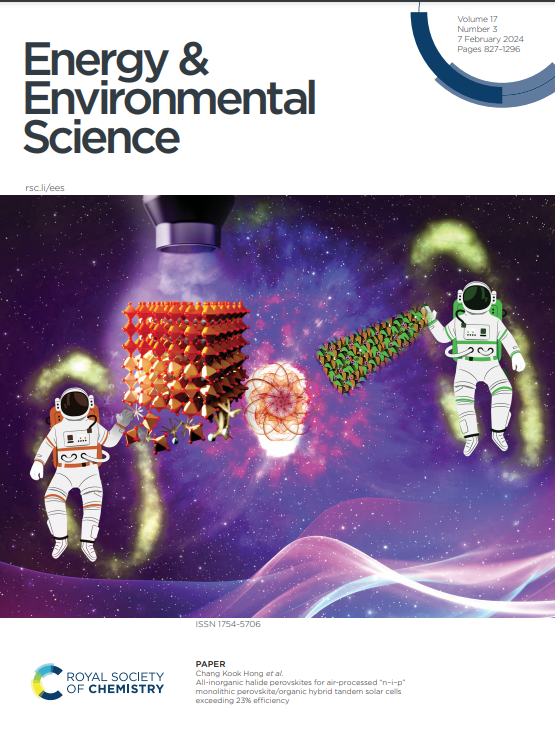Concurrent energy storage and decarbonization by metal-CO2 batteries: aqueous or non-aqueous?
IF 32.4
1区 材料科学
Q1 CHEMISTRY, MULTIDISCIPLINARY
引用次数: 0
Abstract
Rechargeable metal-CO2 batteries (RMCBs) are highly promising for renewable energy storage and simultaneous reduction of carbon footprint from the environment, making it very attractive for next-generation battery development. An electrolyte plays a crucial role in RMCBs and determines the choice of metal anode, kinetics of reactions taking place at electrode-electrolyte interface and thus the battery performance. We comprehensively review the advances in liquid electrolytes for RMCBs, namely, non-aqueous and aqueous, to foster a clear picture of the future RMCBs and their potential applications depedning on the electrolyte system. The advantages and disadvantages of both systems and a stern comparison amongst them is also discussed. The projected battery market/economics and current status in harmony with sustainable energy storage-decarbonization for aqueous and non-aqueous RMCBs is derived followed by the overall summary and outlook. We aim to summarize the existing status and potential of aqueous and non-aqueous RMCBs along with likely improvements necessary for the real-time application of RMCBs.金属-二氧化碳电池的同步能量储存和脱碳:水或非水?
可充电金属-二氧化碳电池(rmcb)在可再生能源存储和同时减少环境碳足迹方面具有很高的前景,使其对下一代电池的开发非常有吸引力。电解质在rmcb中起着至关重要的作用,它决定了金属阳极的选择、在电极-电解质界面发生的反应动力学以及电池的性能。本文综合评述了rmcb的液体电解质的研究进展,即非水电解质和水电解质,从而对未来的rmcb及其基于电解质体系的潜在应用前景有一个清晰的认识。讨论了这两种制度的优缺点,并对它们进行了严格的比较。推导了与水和非水rmcb可持续能源储存脱碳相协调的预计电池市场/经济和现状,然后进行了总体总结和展望。我们的目的是总结现有的现状和潜力的水和非水的RMCBs以及可能需要改进的RMCBs的实时应用。
本文章由计算机程序翻译,如有差异,请以英文原文为准。
求助全文
约1分钟内获得全文
求助全文
来源期刊

Energy & Environmental Science
化学-工程:化工
CiteScore
50.50
自引率
2.20%
发文量
349
审稿时长
2.2 months
期刊介绍:
Energy & Environmental Science, a peer-reviewed scientific journal, publishes original research and review articles covering interdisciplinary topics in the (bio)chemical and (bio)physical sciences, as well as chemical engineering disciplines. Published monthly by the Royal Society of Chemistry (RSC), a not-for-profit publisher, Energy & Environmental Science is recognized as a leading journal. It boasts an impressive impact factor of 8.500 as of 2009, ranking 8th among 140 journals in the category "Chemistry, Multidisciplinary," second among 71 journals in "Energy & Fuels," second among 128 journals in "Engineering, Chemical," and first among 181 scientific journals in "Environmental Sciences."
Energy & Environmental Science publishes various types of articles, including Research Papers (original scientific work), Review Articles, Perspectives, and Minireviews (feature review-type articles of broad interest), Communications (original scientific work of an urgent nature), Opinions (personal, often speculative viewpoints or hypotheses on current topics), and Analysis Articles (in-depth examination of energy-related issues).
 求助内容:
求助内容: 应助结果提醒方式:
应助结果提醒方式:


